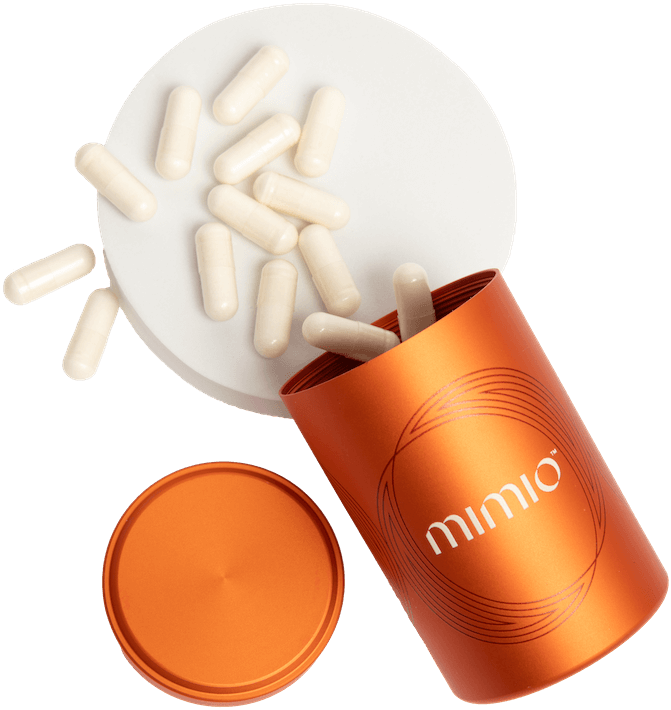Metformin has been making waves in the longevity and biohacking communities. Originally developed as a treatment for type 2 diabetes, this decades-old drug has captured attention for its potential anti-aging properties. Some researchers and health enthusiasts see it as a promising longevity aid, while others urge caution. So, what’s the truth? Let’s explore the science, the risks, and safer alternatives that support healthy aging.
What Is Metformin?
Metformin is a prescription medication most commonly used to lower blood sugar levels in people with type 2 diabetes. It works by reducing glucose production in the liver and improving insulin sensitivity. By reducing the risk of complications and helping manage long-term health outcomes, metformin has been life changing for diabetics.
But outside of diabetes care, researchers noticed something fascinating: people on metformin seemed to have lower risks of certain age-related diseases and, in some studies, even lived longer than those not on the drug. This sparked a wave of interest in metformin as a potential “anti-aging pill.”
Why Is Metformin Linked to Anti-Aging?
Several biological mechanisms make metformin intriguing in the context of longevity:
-
Improved Insulin Sensitivity: Aging is strongly tied to insulin resistance and metabolic decline. By keeping blood sugar stable, metformin may support healthier aging trajectories.¹
-
Activation of AMPK: Metformin stimulates AMPK, an enzyme often called the body’s “longevity switch.” This pathway is also activated during fasting and exercise, promoting energy efficiency and cellular repair.²
-
Reduced Inflammation: Chronic inflammation, or “inflammaging” is one of the hallmarks of aging. Metformin has been shown to dampen inflammatory pathways.³
-
Mitochondrial Effects: Some studies suggest metformin can improve mitochondrial function, which is key for maintaining energy and resilience with age.⁴
These effects overlap with many of the hallmarks of aging, which includes the key biological processes that drive aging, including mitochondrial dysfunction, deregulated nutrient sensing, and cellular senescence.
Metformin Mechanisms for Longevity
|
Biological Effect |
How Metformin Works |
Aging Impact |
|
Improves Insulin Sensitivity |
Reduces glucose production and improves uptake |
Supports metabolic health |
|
Activates AMPK |
Stimulates energy regulation enzyme |
Enhances cellular repair & longevity |
|
Reduces Inflammation |
Suppresses pro-inflammatory pathways |
Lowers risk of chronic age-related disease |
|
Mitochondrial Modulation |
May improve (or impair) energy production |
Affects resilience and endurance |
The Evidence: Promising but Not Perfect
Metformin’s reputation in the longevity world largely stems from observational studies and animal models:
-
Animal Studies: Metformin extended lifespan in several small animal models, including worms and rodents. However, these results have been inconsistent across species.⁵
-
Human Observations: Some large population studies found that diabetics on metformin lived as long, or longer, than non-diabetics not taking the drug.⁶
-
The TAME Trial: The Targeting Aging with Metformin (TAME) trial is underway to study whether metformin can truly slow aging-related diseases in humans. Results are still pending.⁷
The bottom line? While the data is promising, it’s not yet conclusive that metformin slows aging in otherwise healthy people.
The Risks of Taking Metformin for Longevity
Metformin may be relatively safe for diabetics under medical supervision, but that doesn’t mean it’s risk-free for healthy individuals seeking anti-aging benefits.
-
Gastrointestinal Issues: Nausea, diarrhea, and stomach upset are common side effects.⁸
-
Vitamin B12 Deficiency: Long-term use of metformin can deplete B12 levels, leading to fatigue, nerve issues, and cognitive decline if not monitored.⁹
-
Mitochondrial Suppression: While some studies suggest benefits, others show that metformin may impair mitochondrial energy production, especially during exercise.¹⁰
-
Unknown Long-Term Effects in Healthy People: Most safety data comes from diabetic patients. We don’t yet know the risks of long-term use in otherwise healthy individuals.
For biohackers and health optimizers, this creates a dilemma: is the potential benefit worth the possible risks?
Risks of Metformin in Healthy People
|
Risk |
Description |
Severity |
|
Gastrointestinal Issues |
Nausea, cramping, diarrhea |
Moderate |
|
Vitamin B12 Deficiency |
Can cause fatigue, nerve damage if not supplemented |
High |
|
Exercise Interference |
May blunt mitochondrial adaptation to training |
Moderate |
|
Unknown Long-Term Effects |
Limited safety data in non-diabetics |
High |
Safer Alternatives to Mimic Metformin’s Benefits
Fortunately, you don’t need a prescription drug to activate the same longevity pathways metformin targets. Lifestyle strategies and fasting-mimicking supplements offer safer, accessible options.
Metformin vs. Fasting vs. Mimio
|
Feature/Pathway |
Metformin |
Fasting (36-hr) |
Mimio Supplement |
|
AMPK Activation |
Yes |
Yes |
Yes |
|
Supports Autophagy |
Indirectly |
Yes |
Yes |
|
Mitochondrial Support |
Mixed evidence |
Yes |
Yes |
|
Risk of Side Effects |
Moderate |
Mild (hunger, fatigue) |
Low |
|
Prescription Required |
Yes |
No |
No |
1. Intermittent Fasting and Caloric Restriction
Fasting naturally activates AMPK and autophagy (the cellular cleanup process), both of which are central to healthy aging. Even simple approaches like 16:8 intermittent fasting can help improve insulin sensitivity and promote cellular repair.
2. Exercise
Both aerobic and resistance training improve mitochondrial function, insulin sensitivity, and reduce inflammation, which are all areas where metformin also acts.
3. Nutrient-Dense Diets
A diet rich in polyphenols (from berries, tea, and colorful vegetables) supports AMPK activation and mitochondrial health. Omega-3s and antioxidants also reduce inflammation.
4. Mimio Biomimetic Cell Care
Mimio Biomimetic Cell Care was designed to mimic the cellular effects of a 36-hour fast. It supports mitochondrial resilience, autophagy, and nutrient-sensing pathways, all without the side effects of prescription drugs. For people who can’t fast or don’t want to take medications off-label, Mimio offers a scientifically grounded alternative.
Should You Take Metformin for Anti-Aging?
At this point, most experts agree: it’s too early to recommend metformin as a longevity drug for healthy people. The science is intriguing, but we don’t yet have definitive proof, and the risks shouldn’t be ignored.
Instead, focus on proven strategies:
-
Prioritize sleep, exercise, and nutrient-dense foods
-
Experiment with fasting (or fasting-mimicking supplements like Mimio)
-
Manage stress and reduce toxin exposure
These approaches target multiple hallmarks of aging and have robust safety profiles.
Longevity Without the Prescription
Metformin is one of the most studied drugs in the world, and its potential anti-aging benefits are exciting. But until more definitive human trials are complete, its use in healthy people remains experimental, and carries risks.
The good news? You don’t need a prescription to activate the same longevity pathways. With fasting, exercise, and biomimetic supplements like Mimio, you can support your mitochondria, clear out zombie cells, and keep your biology working at its best.
Aging is inevitable. But how you age is up to you!
References
-
Barzilai, N., et al. (2016). Metformin as a Tool to Target Aging. Cell Metabolism.
-
Hardie, D. G., et al. (2012). AMPK: A nutrient and energy sensor that maintains energy homeostasis. Nature Reviews Molecular Cell Biology.
-
Saisho, Y. (2015). Metformin and Inflammation: Its potential beyond glucose-lowering effect. Endocrine, Metabolic & Immune Disorders.
-
Chandel, N. S. (2015). Evolution of mitochondria as signaling organelles. Cell Metabolism.
-
Martin-Montalvo, A., et al. (2013). Metformin improves healthspan and lifespan in mice. Nature Communications.
-
Bannister, C. A., et al. (2014). Longevity benefits of metformin observed in type 2 diabetes patients. Diabetes, Obesity and Metabolism.
-
TAME Trial (Targeting Aging with Metformin). American Federation for Aging Research. Available at: https://www.afar.org/tame-trial
-
McCreight, L. J., et al. (2016). Metformin and the gastrointestinal tract. Diabetologia.
-
Aroda, V. R., et al. (2016). Metformin and Vitamin B12 deficiency: An association to consider. Journal of Clinical Endocrinology & Metabolism.
-
Konopka, A. R., et al. (2019). Metformin inhibits mitochondrial adaptations to aerobic exercise training. Cell Metabolism.



